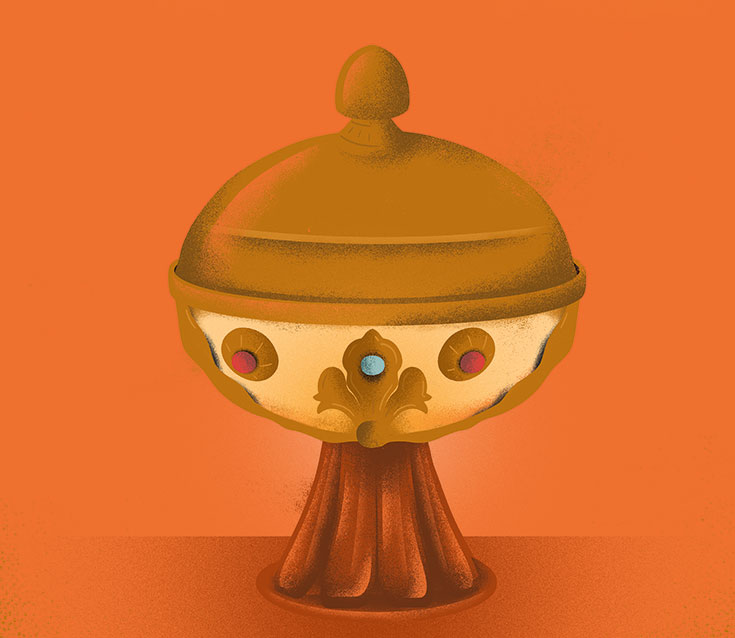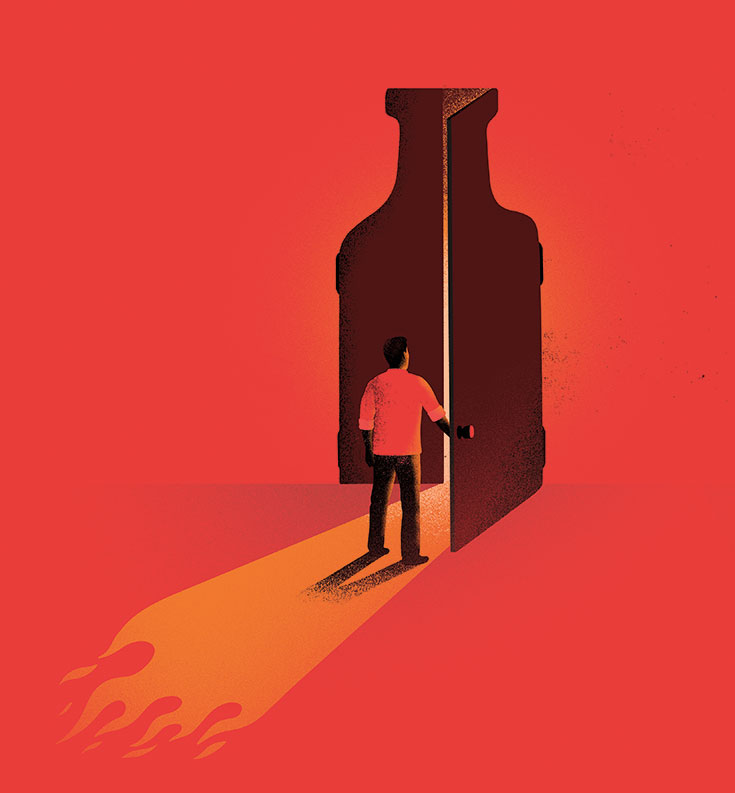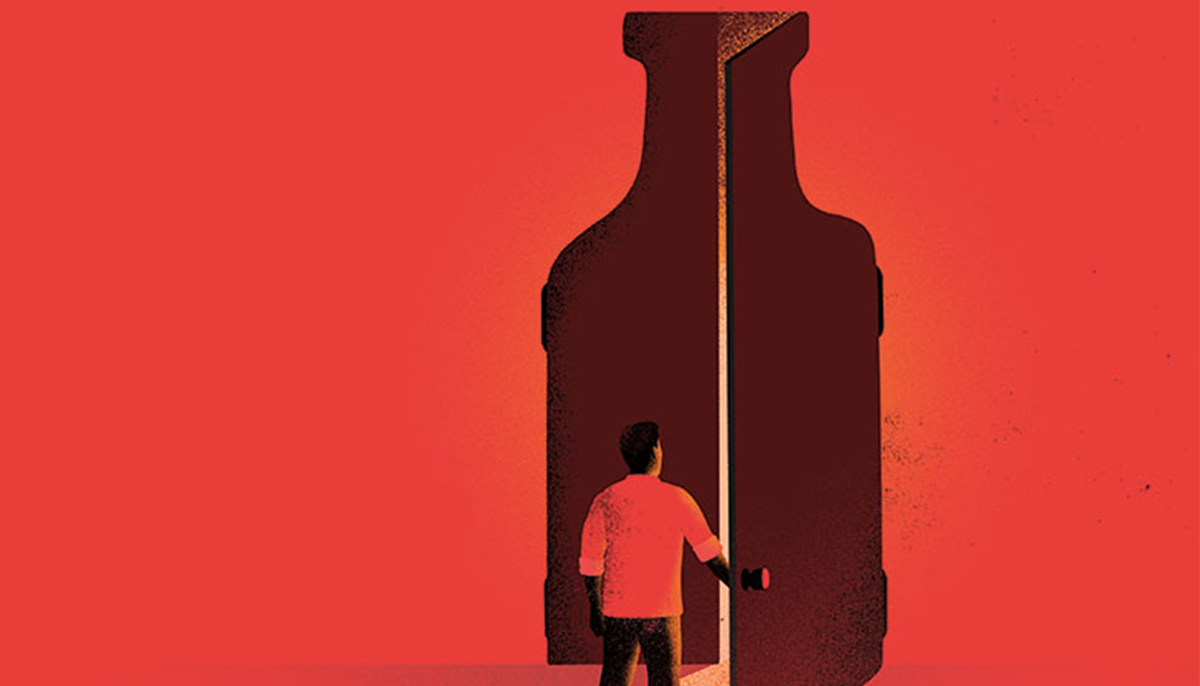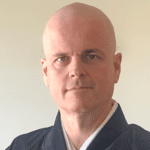Just a Little
A little beer or wine is okay, says Sozan Miglioli, as long as you remain mindful of yourself and others.
In Zen, we try to understand the spirit of the five precepts rather than just the words. The precepts are guides toward the cessation of suffering, not strict or prescriptive admonitions. They are there to open our eyes, to help us see clearly what creates unwholesome karma.
A definition of enlightenment is “to see reality as it is.” For this reason, the precept “I vow not to intoxicate the mind or body of self or others” is very important. It asks us to keep our eyes open, our awareness alive, to what creates suffering in this world. It directly addresses the issue of not seeing things clearly and can guide us on our path of awakening in many different ways.
“Being mindful of the effect of our actions is key.”
Certain traditions also add a positive side, so the precept can be followed from a perspective of abundance, such as “I vow not to intoxicate the mind or body of self or others, but to promote clarity and awareness.” When approaching the precept this way, we include both what fosters difficulty as well as a clear path to taking positive action.
The fifth precept tells us that we shouldn’t compromise our clearmindedness to the point where our moral judgments are hampered. And it doesn’t stop there, because it also asks us not to become a vehicle for others to do so. This is important because while people might remain aware of the ways in which they get intoxicated, they often pay little attention to how they can intoxicate other people’s minds and bodies. Whether its a substance or a word, we should be aware of what we take in and what we offer others.
So as long as a person is not entering a space of clouding body or mind, social drinking or having a glass of wine or a beer can be okay. Of course, if you are in recovery or underage, this is definitely not the case. This is why most traditions who believe in the middle way of using intoxicants don’t just say that it is alright to drink moderately, because that means a different thing to different people. We must also be very aware of the ways in which circumstances change. Maybe you are more tired today, or maybe you have an empty stomach. The meaning of “drinking moderately” changes from one moment to another.
One of the ways to understand one’s relationship to this precept has to do with the intention. Asking yourself why you want to have a glass of wine, or binge-watch a TV show, opens up the possibility of understanding of how you could actually be misusing the substance or the show. Bringing awareness to the “why” is a way to engage with the precept in a healthy way, because there is no good excuse to cloud your judgment, not even a celebration.
Being mindful of the effect of our actions is key. We should stay in touch with our mindfulness every time we drink, watch TV, or engage in social media, because sometimes we can get distracted or distanced from ourselves and before we know it we have had that extra beer or seen that extra episode that tips the balance. Mindfulness ensures that we connect with the fifth precept in a way that is not strict, and at the same time, not naive.

Drink in Wisdom
It’s challenging to relax our fixed views, says Judy Lief. Drinking within a sacred context can help.
From ancient times alcohol has been used as a component of religious rituals. In some Hindu and Buddhist traditions alcohol is called amrita, “no-death,” the elixir of immortality. In the West, alcohol is sometimes called “the water of life.” Sacred rituals such as the Jewish seder and the Christian communion service include wine in the liturgy.
Yet many other spiritual traditions and religious communities teach abstinence from alcohol. We humans are clearly conflicted about how to deal with this powerful substance. Is it a blessing or a curse?
“Mental and emotional rigidity are hard to change.”
The practice of Vajrayana or tantric Buddhism is about transmutation. It is about changing poison into medicine, finding the sacred within the profane, the sanity within neurosis, the blessing within the curse. It is a form of alchemy. But instead of transforming lead into gold, you are transforming confusion into wisdom, and you can use substances like meat and alcohol as a means of doing so.
In Vajrayana Buddhism, practitioners drink alcohol and eat meat in the context of an elaborate group ritual called a vajra feast. For people who because of their vows or tradition refrain from meat and liquor, this is quite shocking—and it is meant to be. You are breaking the rules. By including meat and liquor, you are inviting the forbidden into your practice.
But feast practice is not just about eating meat and drinking liquor. It points to the more fundamental question of how we deal with negativity altogether—all those parts of ourselves and our experiences that we fear and avoid. How do you deal with your anger, your lust, your greed? Do you try to curb them, to avoid them, to keep them under control? Do you try to manage them with your mindfulness and awareness? Or do you find a way to include them in your practice?
Instead of denying, fighting, or avoiding such negativity, in the Vajrayana you make use of it to enrich your practice. The challenge is to confront negativity directly—so directly that your relationship to it begins to transform and you find that within negativity and confusion there is wisdom.
Mental and emotional rigidity are hard to change. It is easy to get stuck in fixed views and lose the freshness and vitality of dharmic practice, and life altogether. In fact, one of the hardest challenges for many serious dharma practitioners is to learn to relax, to loosen up. The use of drinking within the sacred context of a vajra feast can help with that. Alcohol has the power to dissolve the solid boundaries we cling to between confusion and awakening, between self and other. Our tightness, our fixed opinions, our clinging to the familiar, our rigid attachment to control—all this needs to be intoxicated to liberate the wisdom within the confusion.
Mystical experiences are also a form of intoxication, as boundaries dissolve and you are taken over or infused with the divine. Allowing your fixations to dissolve in the sacred context of group practice liberates joy, devotion, humor, and delight. In the vajra feast, when drinking is done in a sacred context and within an elaborate ritual setting, alcohol is not an indulgence and it is not frivolous entertainment.
In The Rain of Wisdom, a collection of realization songs of Tibetan masters, there is a song about three yogis who come to visit the monastery of the great master Gampopa. On the tenth day of the month, according to tantric tradition, the yogis gathered meat and alcohol to prepare a vajra feast, or ganachakra.
They were having a great time chanting and meditating, drinking and eating, singing and dancing, when the head disciplinary monk heard the ruckus. As there was a strict no-drinking rule for the monastics there, he chased after the drunken yogis with a stick and kicked them out.
At the time, Gampopa is in his hermitage, deep in meditation enjoying a vision of many dakas and dakinis arriving at his monastery and filling the space with their powerful presence. But then Gampopa started to see that one by one they were leaving, and the atmosphere of sacred energy was dwindling away. Gampopa sensed that something was not quite right, so he came out of retreat to see what was going on.
When Gampopa heard that his head disciplinarian had kicked out the three yogis, he got angry. He knew that it was the sacred upset of their feast practice that attracted the devas. He ran after the yogis and pleaded with them to come back to the monastery. The song’s poignant refrain alternates between Gampopa’s pleas to “Come back up!” and the yogis’ response, “We’re coming back!”
In his attachment to the outward forms of the monastery, the disciplinarian monk missed what was really going on. Forms that are designed to nurture and hold a direct experience of the sacred can become ends in themselves. The forms remain, but the sacredness is lost. And if there is no inner direct experience of the sacred, what is the point of outer discipline? At the same time, no matter how many profound inner experiences you may have, without discipline they are simply indulgence.
On the tantric path it is important to distinguish the apparent and the hidden, the outer form and the inner experience. What may appear to be discipline may not be; what may appear to be indulgence may not be. The challenge is to maintain proper discipline without losing the inner playfulness and untamed nature of mystical experience.
This juxtaposition of outer monastic or moralistic forms with inner yogic practice is a thread that runs throughout the tantric or Vajrayana path. Gampopa himself followed the monastic disciplines meticulously, and he required his monks to do so also.
But behind the scenes, so to speak, his inner world was visionary and unbounded. So traditionally it is said that even those who meticulously observe monastic rules—who never touch a drop—inwardly follow the disciplines and practices of a yogi, intoxicating fixed mind and transmuting curse into blessing.

Don’t Open the Door
Intoxication can cause heedlessness, negligence, and danger. Justin Lee surveys the Buddhist traditions that abstain from all intoxicants.
Certain Buddhist traditions, chief amongst them the Theravadin school centered in Southeast Asia, have long held an austere perspective on the use of intoxicants. This view is grounded in a strict interpretation of Buddhism’s fifth precept.
The five precepts, which constitute the foundation of Buddhist ethics, form the basic code of conduct observed by practicing Buddhists, both monastics and lay practitioners. The fifth precept is a call to “abstain from intoxicants that induce a state of carelessness,” and breaching this precept is often considered a gateway to violating the other precepts, foremost among them the vows against killing, stealing, sexual misconduct, and harmful speech.
“The common thread of these texts is the same: intoxicants cause heedlessness, negligence, and danger, ultimately disrupting one’s path to spiritual development.”
Today, the prevailing view on strict observance of the fifth precept calls for practitioners to abstain from three subsets of intoxicants: distilled liquors, fermented liquors, and other intoxicants. This is interpreted to include most recreational drugs, including marijuana, narcotics, and hallucinogens.
However, some scholars have made exceptions for medicinal uses and a small set of milder mind-altering substances. For one, the Western Theravadin monk and writer Thanissaro Bhikkhu notes that coffee, tea, tobacco, and betel are not considered intoxicants. Ashin Kelasa, a Burmese Buddhist monk, takes an even more nuanced, if not limiting, view of tobacco, noting that “the great teachers have determined that only unwell monks may smoke cigarettes made with tobacco leaf.” This reflects a traditional Burmese view that tobacco is medicinal (the Burmese word for “cigarette” is literally “rolled medicine”). He further notes that chewing betel nut, which is made with betel leaf, areca nut, and lime and acts as a stimulant, is also permissible. In all cases, however, Buddhists of this mindset consistently categorize alcoholic beverages and recreational drugs as intoxicants that violate the fifth precept.
Beyond the precept itself, traditional texts and commentaries undergird this prevailing view on intoxicants. For example, many Theravada Buddhists learn the Mangala Sutta in the form of the Thirty-Eight Blessings. The twentieth of these blessings calls for refraining from intoxicants as a means of cultivating spiritual development.
In the Sigalovada Sutta, the Buddha identifies six dangers caused by intoxication: loss of wealth, increased conflict, susceptibility to illness and poor health, reputational damage, indecent exposure, and weakened insight. Further, the oft-cited Duccaritavipaka Sutta notes the consequences of habitually consuming alcohol, one of which is rebirth in lower realms.
Another teaching praises the conduct of those who both abstain from intoxicants while simultaneously encouraging others to do the same.
For ordained monks of certain schools, while consuming intoxicants is not considered one of the four grave offenses resulting in expulsion from the Buddhist order, it is nonetheless considered an offense requiring confession. The common thread of these texts is the same: intoxicants cause heedlessness, negligence, and danger, ultimately disrupting one’s path to spiritual development and weakening one’s insight and mindfulness.
Undoubtedly, these views on intoxicants have been heavily shaped by the historical experiences of five Asian countries—Thailand, Myanmar (Burma), Sri Lanka, Cambodia, and Laos—which are home to the overwhelming majority of the world’s Theravada Buddhists. Four of these five countries were colonized by the British and French in the 1800s. Amid increasing contact with European powers, Buddhist practitioners throughout the region gravitated toward more orthodox Buddhist practices, which emphasized strict observance of precepts, to combat the palpable threat of imperialism.
Buddhists in the colonies of Ceylon (now Sri Lanka), Burma (now Myanmar), and Cambodia all railed against intoxicants, especially alcohol, organizing large-scale temperance movements as a means of reviving and restoring Buddhism. In Burma, charismatic Buddhist monks like Ledi Sayadaw (best known for popularizing Vipassana meditation) publicly exhorted followers to undertake pledges to abstain from intoxicants. In nearby Ceylon, hundreds of temperance societies organized by Sinhalese Buddhists had mushroomed throughout the island by the turn of the twentieth century. The legacy of these temperance movements continues to this day.

What Is Your Phone Doing to You?
Media consumption can be a form of intoxication. Ofosu Jones-Quartey suggests bringing mindfulness to bear.
Thich Nhat Hanh often discussed a practice he called “mindful consumption” when teaching about “the four nutriments.” These are four ways we consume the outer world to inform, influence, and sustain ourselves: edible food, the food of sense impression, the food of volition, and the food of consciousness. When we neglect to apply mindfulness to how we consume, we invite all sorts of potential disasters into our lives. But when consumed mindfully, each of these “foods” can be a basis for insight, compassion, and awakening.
“Avoiding media intoxication by practicing mindful consumption, we give ourselves the gift of living with ease and grace.”
Media and entertainment are examples of the food of consciousness, and when we consume them unmindfully, they can become a form of intoxication. You see a trending topic on Twitter involving the calamity of some celebrity, or hear a story on the news about the hateful rhetoric from a politician. Once hooked, you begin voraciously ingesting the toxicity and suffering embedded in these types of media.
What is this doing to you? You scroll through Instagram, experiencing the suffering arising from comparison, experiencing the stress and anxiety of each post vying for your attention, projecting the facade of perfection, inviting greed, self-loathing, and delusion into your heart. How is that impacting you? Are these “foods” not the basis of our current difficulties with intrusive thoughts and anxiety? When the suffering within us—our fear, anger, loneliness, sadness, confusion, self-loathing, you name it—flares up, the pain of experiencing it is often too much to bear. Without mindfulness, we resort to further media intoxication to make ourselves feel better.
Mindfulness, argued Thay, makes it entirely possible to consume in a way that supports healing, growth, and awakening.
When we feel suffering growing within us, instead of fueling it with media that is full of the toxins of anger, violence, mindless desire, and deluded thinking, we can acknowledge the toxins and understand that suffering is a part of the human condition. Thay suggests you might decide instead to listen to a beautiful song to encourage yourself. You may choose to look at a beautiful painting, read poetry, listen to dharma talks, or watch a movie that inspires you.
On social media, you have the power to manipulate the algorithms in your favor by following accounts and people who inspire the best within you, transforming doom scrolling into joy scrolling. Through mindful consumption, we learn to suffer well, allowing the suffering within us to be exposed to the sunlight of our awareness and eventually wither and vanish, never to return, or perhaps return with lessening intensity each time.
At Plum Village, there is an opportunity to take what is known as the five mindfulness trainings. Based on the Buddha’s five precepts—against killing, stealing, lying, sexual misconduct, and intoxicants—the five trainings guide practitioners toward a happier, safer, more ethical life with mindfulness as their guiding light. In the trainings, one commits oneself to be aware of the suffering caused by different actions and to apply mindfulness to help reduce the suffering in the world. This is done by not only refraining from behaviors that cause suffering as much as possible, but by actively engaging in words, actions, and consumption that support happiness, liberation, and awakening.
Avoiding media intoxication by practicing mindful consumption, we give ourselves the gift of living with ease and grace in the world as we work through the human condition. Engaging the world around us with loving awareness and consuming media that supports our liberation, we give ourselves the opportunity to experience happiness in the here and now.



